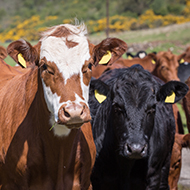APHA rolls out new post-mortem TB test

The new PCR test can detect the bacterium responsible for bovine TB directly from tissue samples collected during post-mortem inspection.
Herd movement restrictions in Britain could be significantly reduced, thanks to a new test that can quickly identify TB infection in animals after death.
The Animal and Plant Health Agency (APHA) is rolling out a new polymerase chain reaction (PCR) test that can detect the bacterium responsible for bovine TB directly from tissue samples collected during post-mortem inspection.
The new method will reduce the time it takes for APHA to report results to livestock keepers to just three weeks. Currently, the main method of TB identification involves growing the bacterium in a laboratory from tissue samples – a process that can take up to 22 weeks.
APHA said the new test would allow it to detect new cases of TB earlier and so prevent the spread of the disease to other farms. It means that so long as PCR results are negative, herd movement restrictions can be lifted much sooner than the existing protocols allow.
Initially, the test will replace microbiological culture for tissue samples collected from the following:
- TB slaughterhouse cases in cattle and non-bovines (animals routinely sent for private commercial slaughter which were found to have lesions suspicious of TB at routine meat inspection)
- non-bovine animals such as goats, pigs and camelids that are removed as TB test reactors, direct contacts or clinical TB suspects, and cases where TB lesions are identified on post-mortem examination in a veterinary laboratory
- domestic pets, such as cats and dogs, and exotic species of animals submitted to APHA for laboratory investigation.



 The RCVS has announced a new version of its 1CPD mobile app, with enhanced features for veterinary surgeons and veterinary nurses to record their continuing professional development.
The RCVS has announced a new version of its 1CPD mobile app, with enhanced features for veterinary surgeons and veterinary nurses to record their continuing professional development.